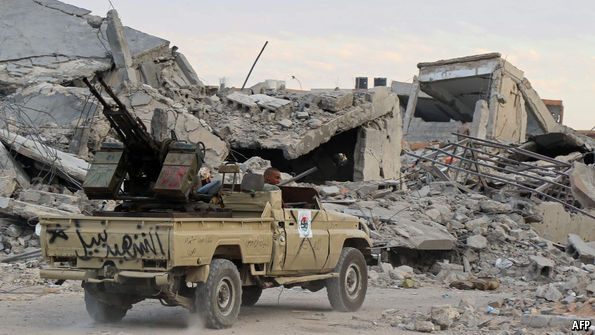Libya is a test of whether the jihadists of Islamic State can adapt

THE ground is shrinking beneath the feet of the jihadists of Islamic State (IS). Iraqi troops are moving closer to the centre of Mosul, the last big city under its control in Iraq, while Kurdish and Arab fighters eye Raqqa, its putative capital in Syria. How will IS react—and, perhaps, adapt—when it loses its remaining territory? To answer that question, look to Libya, where the jihadists have been pushed out of their stronghold in the coastal city of Sirte.
Mired in civil war, Libya has become something of a hub for jihadists in the region. At its height earlier this year, IS controlled over 150 miles (240km) of the country’s coastline, according to the UN. Sirte, the hometown of Muammar Qaddafi, Libya’s former dictator, was even seen as a fallback capital for the group, should it lose Raqqa. But, after nearly seven months of intense fighting, it has been dislodged from its Libyan base.
The campaign against the jihadists was nominally led by a UN-backed “government of national accord” (GNA) in Tripoli, the capital, though militiamen from Misrata, whose loyalty is decidedly fickle, did most of the actual fighting. They were backed by American air strikes. There have been more than 500 of those since August. IS was once thought to have several thousand local and foreign fighters in Sirte. But many, including several leaders, are now believed to be dead.
Analysts warn that the group still poses a significant threat—to the West, the region and Libya itself. Jonathan Winer, America’s special envoy to Libya, told Congress last month that IS’s remaining fighters were probably forming underground cells around the country. “We believe they are waiting for opportunities to engage in further attacks in Libya or its neighbours, and if possible to reassert [IS] geographically,” he said. Nicholas Rasmussen, America’s top counterterrorism official, says he is concerned about attacks on foreign targets by the jihadists.
Hundreds of jihadists are thought to have retreated south from Sirte during the fighting. Others were already there. IS has long had fighters scattered around Libya. In Benghazi they have attacked forces under the command of Khalifa Haftar, an anti-Islamist general, and may be linking up with other Islamist militants. IS fighters can also be found in the country’s vast stretches of desert, from where they have staged attacks on Sirte and elsewhere. Though weakened, they might find succour via the networks of various jihadist groups, such as Ansar al-Shariah and al-Qaeda in the Islamic Maghreb.
Beyond Sirte, the same conditions that allowed the group to flourish still exist. The GNA cannot even secure the capital, parts of which are controlled by armed groups that support a previous Islamist government. Yet another government in the east, this one supported by Mr Haftar, also refuses to stand down. His forces recently took control of several oil facilities, which should boost his leverage if the UN-backed peace plan that produced the GNA is renegotiated, as some have suggested.
But many believe Mr Haftar, who paints most Islamists as terrorists, has no intention of laying down his arms. His forces recently repelled a coalition of militias (supported, some claim, by the GNA’s defence minister) that tried to take back the oil facilities under his control. Backed by Egypt, the United Arab Emirates and Russia, Mr Haftar might decide to push further west. His supporters hope that Donald Trump, America’s president-elect and a fan of anti-Islamist strongmen, will also take his side. But Mr Trump has shown little interest in Libya. Meanwhile, with the campaign in Sirte ending, America’s bombing of IS will soon fall under stricter rules of engagement.
Despite the setback in Sirte, and reported tension between local and foreign fighters, IS will continue to benefit from the chaos in Libya. Arms are easy to obtain, the borders are porous and the disgruntled population provides ample recruits. The terrorists can operate and train in the country’s vast ungoverned spaces, producing attacks on neighbours such as Tunisia, which it has already hit. Until a broader peace is agreed upon and an effective government established, IS soldiers will cause trouble in Libya. The same will be true in Syria and probably Iraq, even after Raqqa and Mosul fall.

No comments:
Post a Comment